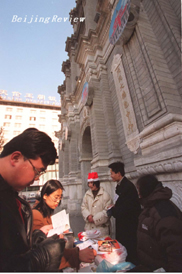
Han Yu, a 22-year-old flight attendant in Beijing, is a fan of Tom Hanks and Jean Reno, but she refused to see The Da Vinci Code, which features the two stars, when the film debuted at a local cinema on May 17. Due to the time difference, the first showing in China of this much-anticipated movie was actually six or seven hours prior to its official opening at the 59th Cannes Film Festival. Nevertheless, Han decided not to see the movie.
The reason is quite simple: Han is a pious Christian, and The Da Vinci Code offended her beliefs.
Su Hui, a 28-year-old employee of a medical research institute in Beijing, also declined to see the movie, despite her captivation with Tom Hanks, claiming that she had recently joined the Christian Church.
"I've already read the novel, which claims that the Bible we see today is not at all written by God, but is a product of heretics. The author of this novel argues that people's belief in Christianity in the past 2,000 years is carried on by concealing the truth." Su said she believes The Da Vinci Code posed challenges and a threat to the Bible and the Christian belief that derives from this classic.
For many Chinese, their initial exposure to the Bible might not have had a purely religious basis, but it is clear that they have been influenced by it in various ways. Priest Cao Shengjie, President of the China Christian Council, said in a speech in Los Angeles that more than 40 million copies of the Bible (Chinese version) have been issued in China since the late 1970s and the early 1980s. Some readers of the Bible later decide to become Christians.
Reconciling science and religion
Su said she treated the Bible as an English reference book for vocabulary for the Graduate Record Examination when she read it for the first time in her third year of college, preparing to go to the United States for further study in biology.
"To be frank, at the beginning, it was difficult for me to accept the awkward-sounding and cruel stories. I was an atheist and always wanted to get the exact cause of everything, so I decided to find fatal problems of logic in the Bible or even in the belief of Christianity."
But, continuing her reading, Su said she increasingly found Jesus to be admirable. "His courage, confidence and faith have deeply impressed me. It always filled me with esteem for Jesus when I came to stories about how he cured people of diseases, enlightened people and offered consultations to the common people. The Book of Jonah convinces me that Jesus was a great philanthropist," she said.
Yet, Su was a student of biology, with a belief in evolution. "God is great and instructions in the Bible are wonderful, but I just couldn't believe in the existence of God--I never believed that God created the world and mankind."
| 